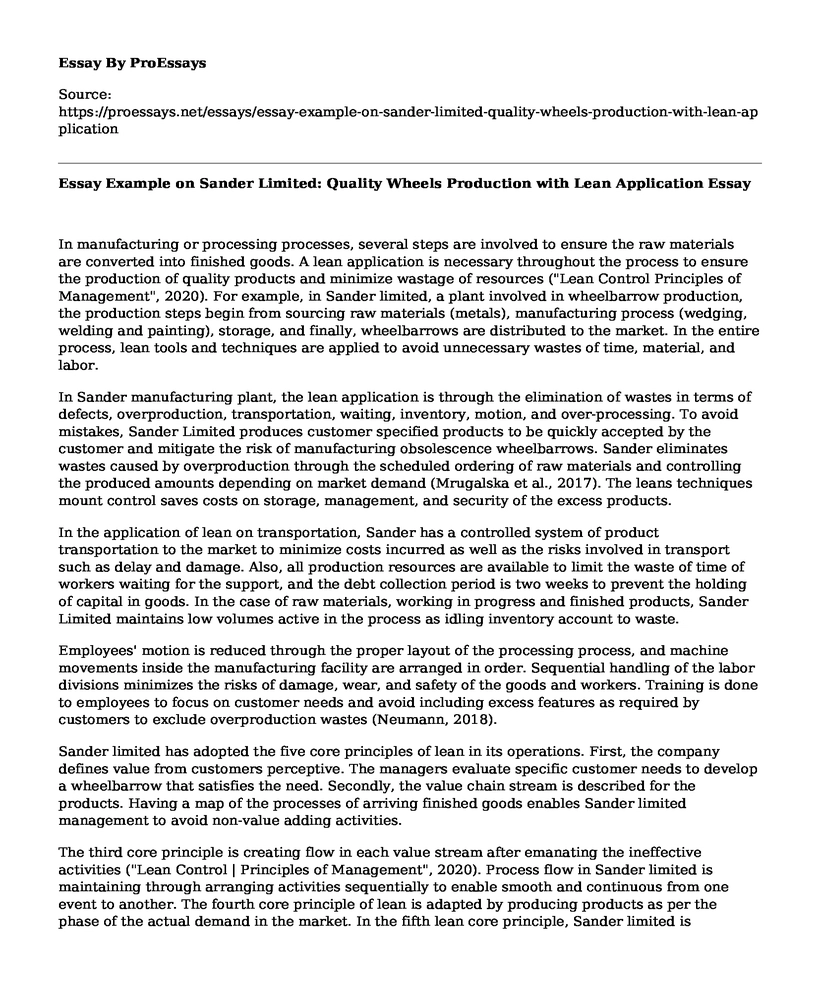In manufacturing or processing processes, several steps are involved to ensure the raw materials are converted into finished goods. A lean application is necessary throughout the process to ensure the production of quality products and minimize wastage of resources ("Lean Control Principles of Management", 2020). For example, in Sander limited, a plant involved in wheelbarrow production, the production steps begin from sourcing raw materials (metals), manufacturing process (wedging, welding and painting), storage, and finally, wheelbarrows are distributed to the market. In the entire process, lean tools and techniques are applied to avoid unnecessary wastes of time, material, and labor.
In Sander manufacturing plant, the lean application is through the elimination of wastes in terms of defects, overproduction, transportation, waiting, inventory, motion, and over-processing. To avoid mistakes, Sander Limited produces customer specified products to be quickly accepted by the customer and mitigate the risk of manufacturing obsolescence wheelbarrows. Sander eliminates wastes caused by overproduction through the scheduled ordering of raw materials and controlling the produced amounts depending on market demand (Mrugalska et al., 2017). The leans techniques mount control saves costs on storage, management, and security of the excess products.
In the application of lean on transportation, Sander has a controlled system of product transportation to the market to minimize costs incurred as well as the risks involved in transport such as delay and damage. Also, all production resources are available to limit the waste of time of workers waiting for the support, and the debt collection period is two weeks to prevent the holding of capital in goods. In the case of raw materials, working in progress and finished products, Sander Limited maintains low volumes active in the process as idling inventory account to waste.
Employees' motion is reduced through the proper layout of the processing process, and machine movements inside the manufacturing facility are arranged in order. Sequential handling of the labor divisions minimizes the risks of damage, wear, and safety of the goods and workers. Training is done to employees to focus on customer needs and avoid including excess features as required by customers to exclude overproduction wastes (Neumann, 2018).
Sander limited has adopted the five core principles of lean in its operations. First, the company defines value from customers perceptive. The managers evaluate specific customer needs to develop a wheelbarrow that satisfies the need. Secondly, the value chain stream is described for the products. Having a map of the processes of arriving finished goods enables Sander limited management to avoid non-value adding activities.
The third core principle is creating flow in each value stream after emanating the ineffective activities ("Lean Control | Principles of Management", 2020). Process flow in Sander limited is maintaining through arranging activities sequentially to enable smooth and continuous from one event to another. The fourth core principle of lean is adapted by producing products as per the phase of the actual demand in the market. In the fifth lean core principle, Sander limited is continuously evaluating and improving the existing business operations to remain in the market.
Conclusion
Lean is, therefore, a systematic manner of elimination non-value adding activities in a process, continuous process improvements, and maintain the flow of production as per the pull of actual demand. The concept of lean can be confusing to managers for several reasons. First, there is no agreed meaning of Lean among scholars. Furthermore, lean objectives demand too much discipline, takes time to be implemented, the processes are always complex, and lean accept different methods to be implemented as it depends on the nature of the process.
References
Lean Control | Principles of Management. Courses.lumenlearning.com. (2020). Retrieved 15 June 2020, from https://courses.lumenlearning.com/principlesmanagement/chapter/15-6-lean-control/
Mrugalska, B., & Wyrwicka, M. K. (2017). Towards lean production in industry 4.0. Procedia engineering, 182, 466-473. https://www.sciencedirect.com/science/article/pii/S1877705817312717
Neumann, B. P. (2018). U.S. Patent No. 9,877,437. Washington, DC: U.S. Patent and Trademark Office. https://patents.google.com/patent/US9877437B2/en
Cite this page
Essay Example on Sander Limited: Quality Wheels Production with Lean Application. (2023, Aug 29). Retrieved from https://proessays.net/essays/essay-example-on-sander-limited-quality-wheels-production-with-lean-application
If you are the original author of this essay and no longer wish to have it published on the ProEssays website, please click below to request its removal:
- Industrial and Systems Engineering Essay
- Paper Example on Safety Engineering
- Analysis of Empirical Implications - Paper Example
- The Jacobs' Family Values Essay Example
- Essay Example on Building Trust: Integrity and Honesty Are Key
- Essay Sample on Good Leaders: A Uniquely Composed Picture
- What a Good City Should Do - Free Paper Sample







